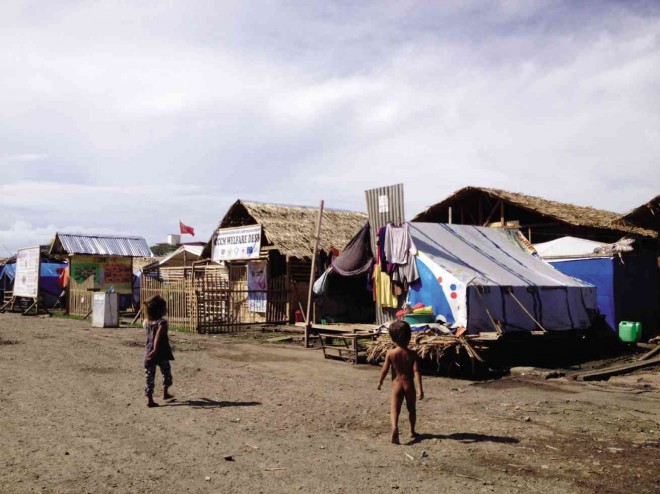
CHILDREN at Don Joaquin Enriquez Memorial Sports Complex, home to thousands of evacuees in Zamboanga City. JULIE S. ALIPALA/INQUIRER MINDANAO
ZAMBOANGA CITY— The city government is thinking of building “conjugal spaces” for couples who lack privacy in their own tents in evacuation centers.
Mayor Maria Isabelle Climaco-Salazar, in a press briefing on Monday, said the building of “conjugal spaces” was being considered to address a “natural” and “urgent need.”
Dr. Marcy Carpizo, director of Peace and Human Security at Western Mindanao State University, earlier suggested the construction of “a tent or a room where couples could express their sexual needs away from their children.”
“The special room or tent will spare the children from witnessing their parents’ sexual activity,” Carpizo said in an earlier interview with the Inquirer.
On Monday, Salazar urged Carpizo, who is also the national president of the Philippines Against Child Trafficking, to be part of the city’s protection cluster for the evacuees.
The idea was commendable for evacuee Isnira Jimlani, except that, she said, she would be ashamed to line up for the “conjugal space.” “What if there’s a long line?” the mother of 14 children asked.
Dr. Rodelin Agbulos, city health officer, said the idea of building a conjugal space was first brought up in October last year, weeks after Moro National Liberation Front (MNLF) members attacked villages here, displacing hundreds of thousands of residents.
The fighting between government forces and MNLF members left thousands of residents homeless.
But Agbulos said most of the evacuees did not see the conjugal space acceptable. “They said it would not sound and look good to see persons getting in and out of that tent,” Agbulos said.
He said another earlier suggestion was “to give coupons to couples to be accommodated in motels.”
He said some religious leaders were against the plan.
Fatima Pir Allian, program coordinator of Nisa Ul Haqq Fi Bangsamoro (Women for Justice in the Bangsamoro), said conjugal spaces could be simply described as “sex tents.”
“The local government should address the situation on sex, rape and whatnot by providing a decent home for the families,” Allian said.
“[A home] that is not shared by more than one family. A home that has division of spaces for the unique needs of children and their parents,” Allian added.
Professor Alih Aiyub, secretary general of the National Ulama Council of the Philippines, said building a conjugal tent would “not be a wise decision.”
“You invite the young to imagine dirty, malicious thoughts as they watch couples come in and out of the tent. The government should instead build temporary shelters,” Aiyub told the Inquirer. Julie S. Alipala, Inquirer Mindanao